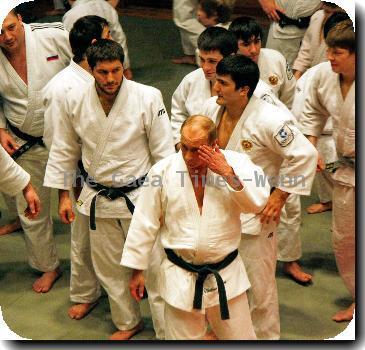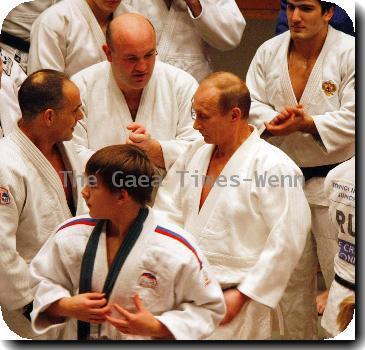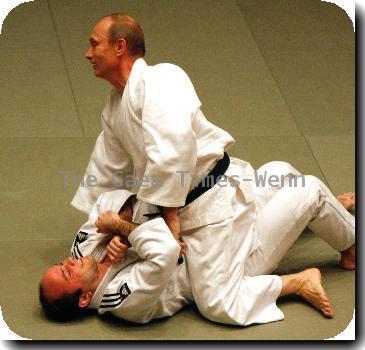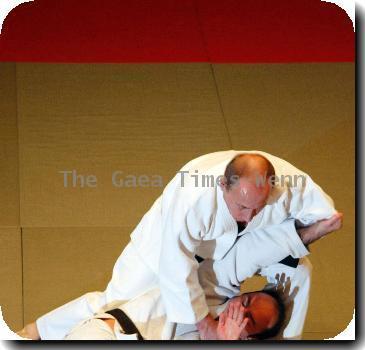Ex-oil giant Yukos tells European rights court that Russia sought to ‘destroy’ the company
By Deborah Seward, APThursday, March 4, 2010
Yukos tells court: Russia sought to destroy us
STRASBOURG, France — The Russian government deliberately sought to “destroy” the now-defunct oil giant Yukos for political reasons, a lawyer for the company argued Thursday before the European Court of Human Rights.
Thursday’s long-awaited hearing marked a milestone in Yukos’ efforts to win acknowledgment that the Russian government’s actions were “unlawful, disproportionate, arbitrary and discriminatory, and amounted to disguised expropriation” of the company.
Yukos, whose primary subsidiary once produced as much oil each year as Libya, has submitted a claim for $98 billion in damages, the largest in the court’s 50-year history. The court normally awards damages of much smaller amounts. Its judgments are binding.
It was the first time since Yukos filed a claim against Russia in April 2004 that lawyers for the two sides presented arguments face-to-face in the court, which deals with violations of the 1950 European Convention on Human Rights.
An adverse judgment would be highly embarrassing to the Kremlin and a blow to efforts to draw international investors back to Russia. A court finding that no violation had been committed would vindicate the Russian government’s relentless pursuit of Yukos and its Russian executives.
Western diplomatic observers and Russian human rights activists also attended the hearing, and Yukos executives expressed satisfaction that the case was still being considered.
“It is our first chance to have the Yukos saga heard in a completely independent, fair environment,” former Yukos CEO Steve Theede said in a satellite news conference from Houston after the hearing.
He said major stakeholders and some 50,000 shareholders could benefit if the court were to award monetary damages.
Russian authorities had accused Yukos of using shell companies to hide revenue from tax authorities. Yukos founder Mikhail Khodorkovsky, who is in prison in Moscow, has claimed that Russian authorities illegally drove the company out of business.
Russian authorities began pursuing Yukos in 2003. Through the courts, they ultimately froze its assets, forced it to sell its shares in other companies and declared it insolvent in 2006 before the company was finally liquidated a year later.
Khodorkovsky, once Russia’s richest man, founded the company in the chaotic years that followed the 1991 Soviet collapse. He was convicted on charges of fraud and tax evasion and has been imprisoned since 2003.
The Kremlin’s critics, however, call him a political prisoner, a powerful oligarch arrested for daring to become involved in politics when then-President Vladimir Putin was in power.
The European court is examining Yukos’ complaints of irregularities in the Russian authorities’ proceedings on its tax liability, the unlawfulness and size of the tax assessment and the forced sale of Yukos’ main production unit Yuganskneftegaz, among other complaints.
The nine-judge panel began deliberations later Thursday, but a decision is not expected for months. Lawyers for the Russian government asked that the case be transferred to a larger chamber, which could further delay a final ruling.
Piers Gardner, representing Yukos, defended the way the company had handled its tax payments in Russia.
“Nothing was secret, nothing was hidden and nothing was wrong with these arrangements,” Gardner said in his 90-minute statement, adding that Russian authorities’ “aim was to destroy Yukos.”
Gardner said Yukos had been presented with 100,000 pages of documents in 2004 and given only several days to examine them. He also said the decision to freeze Yukos assets aimed to “paralyze” the company.
“The rule of law was suspended in respect to Yukos,” Gardner said, urging the court to award full monetary damages.
Lawyer Michael Swainston, representing the Russian government, argued that the court can only accept cases concerning individuals instead of companies.
“This case should not be entertained by this court at all,” Swainston said. He defended the Russian government’s actions, saying Yukos had committed massive tax fraud and that the orders to freeze Yukos’ assets had been “limited in scope.”
Swainston also argued the case should be dismissed on the grounds that similar cases are being adjudicated in Sweden and the Netherlands and that “parallel cases” are not allowed.
“This is misconceived application with no merit,” he said.
Only the two lawyers and judges spoke during the more than four-hour hearing conducted in English and Russian.
Fearful the company would never get a fair hearing in a Russian court, Yukos representatives filed their complaint with the European court in April 2004, claiming the company was “targeted by the Russian authorities with tax and enforcement proceedings, which eventually led to its liquidation.”
The Council of Europe monitors the execution of its judgments, particularly to ensure payment that have been awarded by the court. In the past, the rulings have obliged governments to amend laws and practices in many fields.
Russian citizens long have seen the European court as a place they could get a hearing. Nearly one-third of the current 119,300 applications to the court are from Russia. Of the court’s 862 judgments concerning Russia, the court found violations of the human rights convention in 815 of them.
As a result, Russian authorities have been hostile to the court’s work. Recently, however, Russia has moved to ease that stance. In January, Russian lawmakers ratified an international agreement to strengthen and speed up the work of the court after years of refusing to do so.
In Moscow, anti-government protesters gathered Thursday at a court house that was holding a trial in a second case against Khodorkovsky.
“Maybe there (in Strasbourg) it will be a fair trial, a just trial. I have high hopes for the Strasbourg court, it has a good reputation as opposed to our courts. Our courts have bad reputation,” protester Dmitry Sotnikov told AP Television News.
However, Russian human right lawyer Karinna Moskalenko, who attended Thursday’s hearing in Strasbourg, said she didn’t think the proceedings would have an impact on Khodorkovsky’s legal struggles inside Russia.
Tags: Arts And Entertainment, Children's Entertainment, Corporate Crime, Eastern Europe, Europe, France, Moscow, Personnel, Russia, Strasbourg, Tax Evasion, Vladimir Putin, Western Europe



